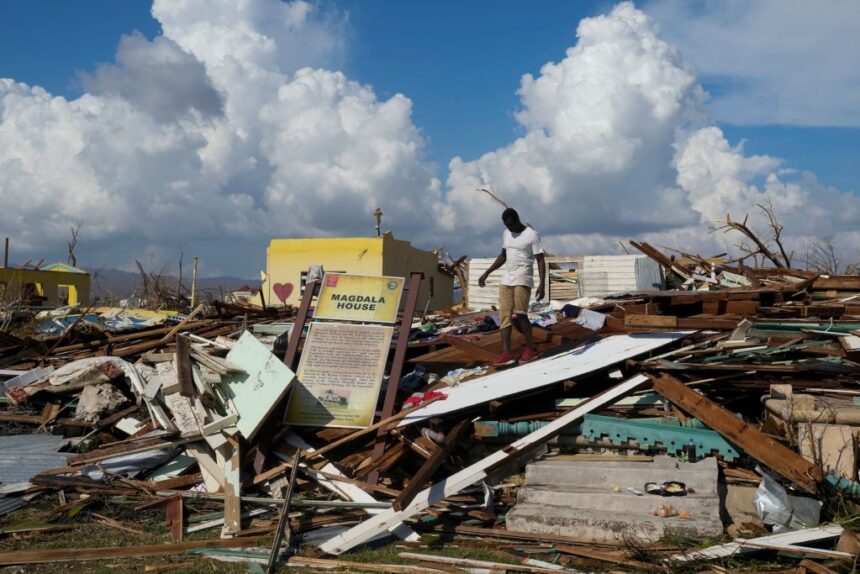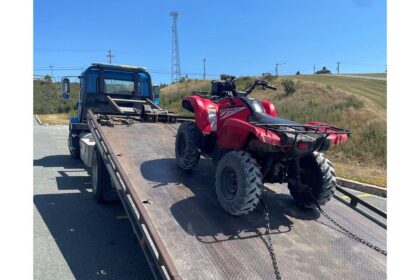Last week, countries across the Caribbean were hit by Hurricane Melissa, one of the strongest hurricanes to make landfall in Atlantic history. The storm brought flooding to a number of islands in the region and devastated Jamaica, with at least 32 people dead and parts of the country still “underwater” as of October 28, according to officials. As climate change makes storms more frequent and intense, the brunt of the devastation is borne by countries in the Global South, or lower-income countries in Africa, Asia, the Caribbean, Latin America and the Middle East. These regions experience a disproportionate share of the impacts of climate change — including rising temperatures, droughts, floods and storms — despite having much smaller carbon footprints than wealthier nations, like Canada. Researchers predict climate change will impact 143 million people in the Global South by 2050. For those in Canada’s immigrant diasporas watching the destruction of their homelands from afar, Melissa is just the latest natural disaster bringing together two disparate concerns: money and climate change. In 2017, $5.2 billion was sent outside of Canada by residents originally from countries designated as eligible for “official development assistance,” according to Statistics Canada. These funds were mostly used for living and medical expenses, with the largest share going to Southeast Asia and Oceania. Transfers to Jamaica that year totalled $96 million. The international remittance company JN Money sees about 8,000 to 10,000 transactions from Canada to Jamaica every month, according to Claude Thompson, a Toronto-based regional manager. In the wake of Melissa, Thompson says he expects to see transactions temporarily jump by 10 per cent. But as of Oct. 30, many affected areas in Jamaica were still without electricity, leaving them with no way to receive money. Despite Canada’s persistent wage gap between immigrants and residents born here, many still send aid in spite of the cost-of-living squeeze. “I don’t think that anyone is thinking so much about the cost [of sending aid],” Didan Wedderburn, lead of the Newfoundland and Labrador chapter of the Jamaican Canadian Association, says. “We haven’t gotten to the stage of thinking, is this worth the cost? Even if we might typically compare figures when we’re not in crisis.” After disasters, communities step in when governments fail For immigrants living in Canada, sending money to their home countries isn’t just about financial support. Remittances are “also signs of love and kinship and affection and obligation,” York University professor Ethel Tungohan explains. A Canada Research Chair in Canadian Migration Policy, Impacts and Activism, Tungohan says one reason immigrants send funds during climate disasters is because they “acknowledge failed state responses to the immediate needs that climate-ravaged communities are facing.” Much of that help is sent directly to family members as remittances, rather than in donations to disaster response organizations on the ground. “There’s a lot of distrust when it comes to horrible institutional channels,” Tungohan says. “People worry about the professionalization of aid organizations and are most likely to trust people they know and have vetted.” After Typhoon Haiyan, which claimed over 6,000 lives in the Philippines in 2013, Tungohan says scammers targeting that diaspora were rampant. And after the 2010 earthquake in Haiti, millions of people around the world donated half a billion dollars to the American Red Cross — money that NPR and ProPublica later reported went largely to poorly managed projects with unverified claims of success. The reported number and amount of remittances from Canada is likely an underestimate, Tungohan says, because many migrants use informal money-sending channels, such as the Philippines-based app GCash. “Because of state failure, there are people who are skeptical that the remittances they send actually go to the intended recipients,” she says. Hurricane Melissa highlights inequities facing Caribbean workers in Canada Every year, tens of thousands of agricultural workers come here on seasonal permits and in 2020, about 12 per cent were from the Caribbean. Many head home for the winter around now — but this year, Jamaicans and other Caribbean nationals are unsure if they have homes to return to. Thousands of seasonal farm workers come to Canada from the Caribbean and Latin America every year. In a letter to the federal government, an advocacy group said Hurricane Melissa shows Canada should make their Employment Insurance contributions easier to count on in times of need. Photo: Christopher Katsarov Luna / The Narwhal On Nov. 3, the advocacy group Justice for Migrant Workers sent an open letter to Prime Minister Mark Carney about flaws in the federal Employment Insurance program, drawing attention to the fact that migrant workers pay into the program, but are rarely able to access it in times of financial uncertainty like now. “This is not an act of charity. It’s a call to ensure migrant agricultural workers are able to access their entitlements to Employment Insurance in their time of need,” the letter reads. The group argues that powerful countries like Canada have long benefitted from an extractive relationship with countries like Jamaica — echoing the United Nations, which has said wealthier countries should pay for climate adaptation in places that they’ve long exploited for labour and resources. The diaspora is also stepping up to support their motherlands. Sylvanus Thompson, the disaster relief coordinator at the Jamaican Canadian Association, says his organization is working with Mississauga-based Atlas Cargo, which is offering to ship donated supplies to the island for free. As climate change makes natural disasters like hurricanes, typhoons and tropical storms more destructive, Thompson says organizations like his have been looking for ways to send aid right away when there’s a crisis, rather than having to fundraise first. The association has long discussed a general disaster relief fund, but no concrete action has taken place yet. “We find that persons are more likely to respond in times of disaster,” he says. “But we won’t give up on [starting the fund]: it’s important to do that so we always have something to draw on.” The association is hosting a relief concert in Toronto this Thursday. Marcus Pereira, the founder of Reclaim Rebuild Eg West, agrees. “We can’t wait for disaster to strike, we should be redistributing these resources year-round when we know that these problems are occurring,” Pereira says. Pereira, whose family is from Grenada, says sending barrels full of supplies is a longstanding part of Caribbean immigrant culture. When Hurricane Beryl swept through the region last year and impacted Grenada, “the Jamaicans came through for us,” he says. “It’s a diaspora-wide effort to help those in need.” His youth-led advocacy group is dedicated to fighting gentrification and preserving the cultural heritage of Toronto’s Little Jamaica neighbourhood. Now, it’s running a campaign to collect monetary and in-kind donations in collaboration with the Jamaican Canadian Association. “It feels like almost every year, there’s going to be a hurricane ripping through so we need to be ahead of the curve,” Pereira says. “It’s our doing in North America that is currently impacting the Global South. They’re paying for our emissions and our poor environmental practices, so it’s only right for us to get ahead of the game.” Recent Posts Immigrants send billions home already. Storms like Hurricane Melissa add to the pressure Canadians from developing countries send billions to friends and family every year. Devastation in Jamaica… These are the environmental programs to be cut under Carney’s first budget Nov. 5, 2025 11 min. read Prime Minister Mark Carney’s budget scales back rules around greenwashing, and hints an oil and… ‘By the wayside’: rural Albertans are angry at companies not paying their bills Nov. 5, 2025 19 min. read Landowners ring alarm bells about the Alberta government paying them on behalf of delinquent oil…
Immigrants send billions home already. Storms like Hurricane Melissa add to the pressure











